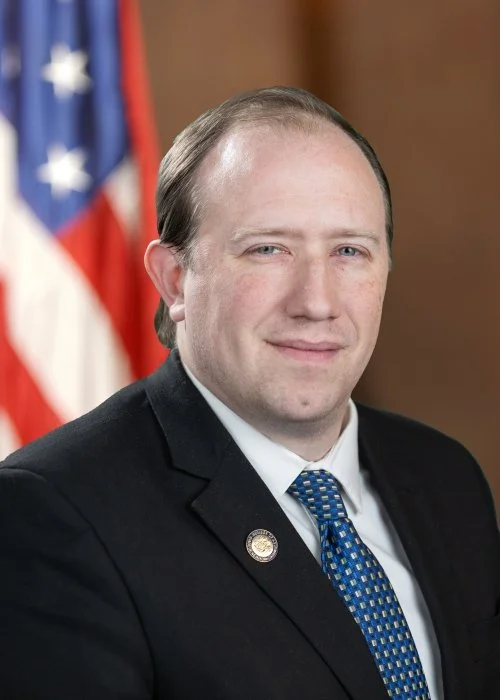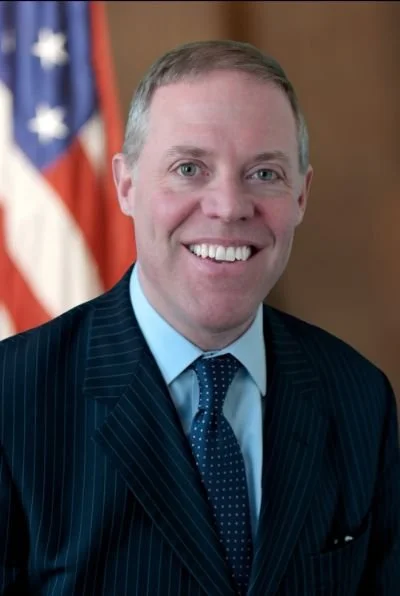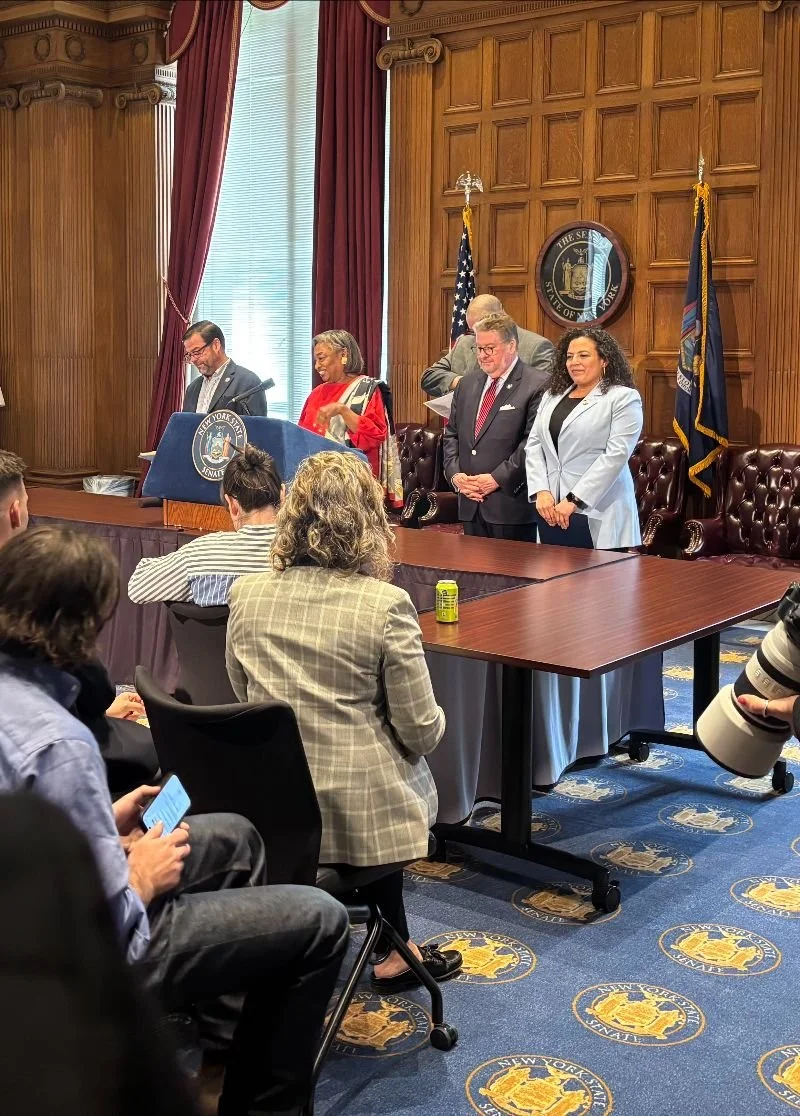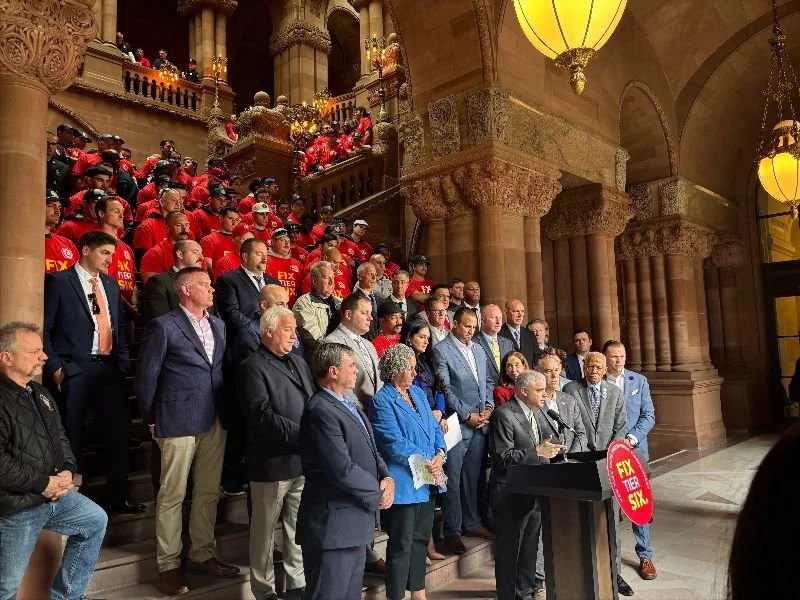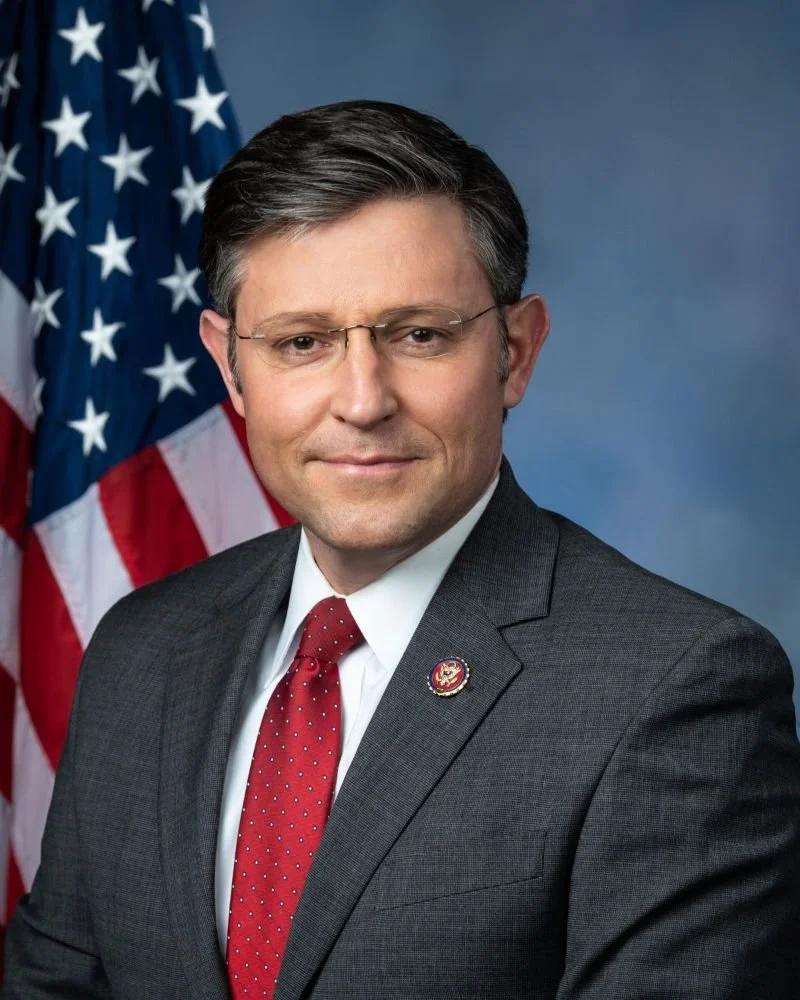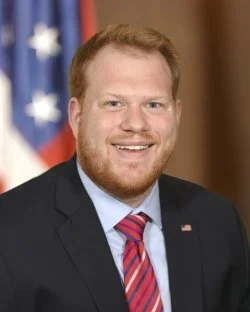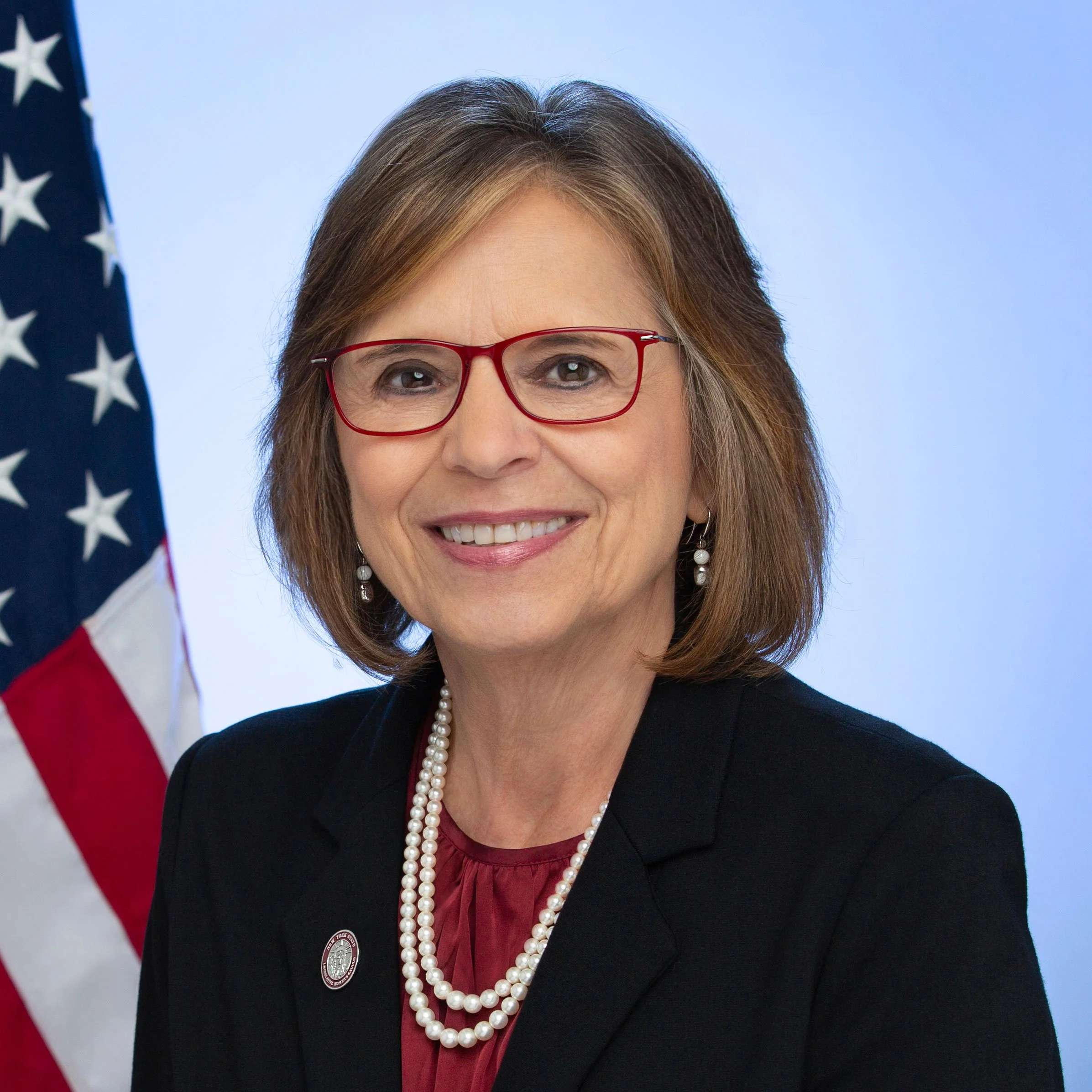Friday Morning Brief May 23, 2025
Member Spotlight
Assemblyman Joe Sempolinski
Assemblyman Joe Sempolinski joins us to discuss his Western New York-based district, priorities, and vast experience in public service. Before being elected to the Assembly, he served his communities by working in the Legislature and Congress, as well as serving in Congress. Currently, he is a member of various Assembly committees, including on Education, Labor, Mental Health, and People with Disabilities.
What district do you represent?
I'm proud to represent the 148th Assembly District, which is all of Cattaraugus County, all of Allegany County, and a portion of Steuben County in the Southern Tier.
Any landmarks or favorite restaurants in your district that you want to highlight?
One of our biggest landmarks is Allegany State Park. As far as a pure state park, Allegany State Park is the biggest in the state. For a restaurant, Texas Hot in Wellsville is one of the most iconic restaurants for folks in the district. If you want a good hot dog, you will have a great experience at Texas Hot.
What is your favorite music? Favorite bands/artists?
I'm a product of my generation. I was born in 1983. Any music from the mid to late 80s or early 90s would be what I listened to. My wife was born in 1989, so she says the 90s are better than the 80s, but I don't think she's correct. But we're both products of our generation. And if you're playing music from 1985, 86, 87, 88, or somewhere in there, I feel at home because I feel like a kid again. I think everybody feels that the music they listened to as a kid was the best.
What about sports? Any favorite NY sports team?
Buffalo Bills! In the district, the Buffalo Bills are a way of life. Go Bills is a universal greeting. My family and I grew up watching and following the bills. So, when I was in second, third, fourth, and fifth grade, we went to the SuperBowl for four years in a row. And those were really formative experiences. My wife’s family is on a whole other level. Whenever there is a family gathering in the fall, we will get together every weekend and watch the game. Buffalo Bills are truly a way of life in Western New York and the 148th District.
What was your profession before being elected to the Assembly?
I was a congressional district staffer for about five years. I was a congressional district director and briefly an Assembly staffer just before being elected to Congress. When I left Congress, I was the Chief of Staff for my predecessor in the Assembly. So I went from being a congressional staffer to serving in Congress, working in the Assembly, and finally serving in the Assembly. It’s an unprecedented order, and I have been told I’m the first US congressman elected to the state Assembly in 110 years and the 2nd shortest tenured congressman in the history of the state of New York. Before I served in Congress, I was the district director for my predecessor, so I knew the district pretty well, but redistricting dramatically changed the population center. So we needed a unity candidate, and I was a good fit for that. It was an honor to serve the folks and communities in Congress. And now, I serve the same folks and communities in the Assembly because every person in the 148th Assembly District was in the old congressional district.
What experiences from your time in Congress do you hope to bring to the Assembly?
Many folks in the media, leadership, staff, and constituents have asked me if I can be a bridge between “this is what works there” and “this is what works here.” I have a little perspective on whether what happens in Washington could be useful for the folks and communities I represent. A lot of the time, constituents just want their problems solved. They don’t really care whether it’s a federal or a state issue, and they call whoever they sort of know. As a former congressional staffer, I have a lot of relationships with other Assemblymembers, Senators, and members of Congress. So, having these pre-existing relationships is beneficial for constituents’ services, and I can help facilitate discussions between folks in the district and their representatives in Congress.
I’m also lucky to help my colleagues with my prior experiences. We recently had a bill come up in committee regarding Chautauqua Lake. Even though Chautauqua Lake is not in my district, I used to represent Chautauqua Lake in Congress. So I was able to provide input on that bill. One of the beautiful things about the Assembly is that you have 150 people with very diverse backgrounds, and that can lead to improving legislation by understanding where different people are coming from based on the, uh, occupation they had or the region they're from or what have you. And I have the opportunity to have a little bit of a broader background than maybe your typical freshman member.
What local issues are you hoping to address this year?
The communities I represent are in very rural areas. So, we always support and look for economic development and make sure that we can compete with other areas. Pennsylvania is just minutes away, so we are also competing with Pennsylvania. I will be working on anything that creates jobs, opportunities, and a fair distribution of services to rural communities.
What about statewide issues?
I’m very passionate about anything that deals with the disability community. I serve on the Committee on People with Disabilities. I'm the ranker on mental health, which has a lot of similar concerns and issues. I have a daughter with Down Syndrome. And so what's good about working in that area is the people that want to work in that area, whether Democrats or Republicans, usually want to work in that area because of some personal connection, some family member, a friend, or somebody that's a constituent. And so a lot of the partisanship and ideology that maybe comes up in legislation in other areas doesn't exist to the same degree in the policy space surrounding the disability community.
What advice would you give to young folks in your district who want to get more involved in politics?
I would say do the jobs that other people don't want to do. It may be hard work, like going out to get petitions, knocking on doors, or making phone calls – the less glamorous stuff. But if you're the person who's willing to do that, then you will be far ahead because people are going to want you to work on their campaign. You will also get noticed, seen, and appreciated for your hard work. Then people will be attracted to your work ethic and want to be part of your work. Who knows, maybe it will lead you to be a Congressman when somebody needs to do it for 112 days. You never know what might happen as long as you work hard.
Any last comments?
I'm really honored to be here working at the state capitol for the people of the Southern Tier and being their voice. I'm looking forward to the remainder of session and the rest of the year when we get to spend more time back home doing constituent service stuff. So, it's really the honor of a lifetime to be the assemblyman from the 148th district.
Are you a public official or staffer that would like to be featured in our spotlight? If so, reach out to your favorite D&A team member or contact us at team@dickinsonavella.com to set up an interview!
Aung Hset/D&A
Lawmakers' End of Session Priorities
With three more weeks of session (and four for the Assembly), lawmakers are starting to heavily push their legislative priorities. Some of the priorities are continuations of previous advocacies, including the NY for All Act, Packaging Reduction and Recycling Act, and Medical Aid in Dying Act.
NY for All Act has garnered renewed attention this year due to the federal administration’s push for increased deportations. Sponsored by Senator Andrew Gounardes and Assemblymember Karines Reyes, the NY for All Act would prohibit local and state agencies from cooperating with ICE and other federal agencies in detaining immigrants. Medical Aid in Dying Act has also seen a strong push this year, with the Assembly being the first chamber to pass the bill. It's believed that the Senate Democrats conferenced the bill yesterday. The Packaging Reduction and Recycling Act has also been heavily supported by lawmakers and environmental advocates. The bill would require companies to reduce their packaging and invest in local recycling infrastructure. However, there is also a competing bill pushed by some lawmakers that would instead require producers to formulate their own plans for waste reductions.
Lawmakers are also advocating for reforming state correctional facilities after last week’s public hearing on state prisons, statewide COs strikes, and the fatal beatings of two incarcerated individuals by correctional staffers. Lawmakers and advocates have further heightened the urgency of reform after DOCCS Commissioner Daniel Martuscello testified that 46 inmates have died in state correctional facilities so far this year. Lawmakers are also prioritizing addressing the state’s CDPAP transition, with Health Chairs Senator Gustavo Rivera and Assemblymember Amy Paulin introducing and pushing for a new billallowing for more than one fiscal intermediary.
Senate Majority Leader Andrea Stewart-Cousins has so far explained that the Legislature is not expecting to negotiate with Hochul on a “big ugly” omnibus bill and instead will focus on passing standalone bills until session concludes. “I don’t expect a ‘big ugly,’ but I think we’ll be able to get through the next four weeks without a ‘big ugly.’ But we’ll see,” said Stewart-Cousins.
Susan Watts/Office of Governor Kathy Hochul
EXECUTIVE UPDATES
Yesterday, Hochul announced that more than $50 million has been awarded to 50 community revitalization projects. Awarded through the state’s Restore New York Communities Initiative, the funding is expected to help various local municipalities across the state address urban blight and generate economic development. The funding builds upon the state’s commitment to incentivizing economic development and supports the Enacted Budget’s prioritization of the Downtown Revitalization Initiative and NY Forward. “Revitalizing and rehabilitating vacant and blighted areas of our communities for housing or development is vital to make downtowns thrive,” said Hochul.
Earlier this week, Hochul announced the disbursement of $42 million to the Eastern Finger Lakes Coalition for harmful algal bloom mitigation projects. The funding to combat harmful algal blooms in the Finger Lakes Watershed area is expected to support both on- and off-farm projects that align with clean water and pollution prevention plans. The funding builds upon the previous state’s actions to improve the state’s water quality and combat harmful algal blooms, including a previous disbursement of $1.2 million to the Finger Lakes Watershed area. “We are moving this funding quickly to accelerate watershed protection and restoration measures that will reduce nutrient inputs to the Finger Lakes,” said Hochul.
On Wednesday, Hochul announced the execution of 26 large-scale, land-based renewable energy projects across the state. Upon completion in 2029, the energy projects from NYSERDA’s Tier 1 Renewable Energy Standard solicitation are expected to provide over 2.5 gigawatts of clean energy or power more than 670,000 homes, as well as supporting over 1,900 jobs and incentivizing over $6 billion in private investment. The energy projects build upon the state’s commitment to investing in new renewable energy projects to fulfill the state’s Climate Agenda, which sets the goal of achieving an emissions-free economy by 2050.
This week, Hochul announced that over $10.4 million has been awarded to 30 animal care organizations and shelters. Funded through the Companion Animal Capital Fund, the $10.4 million will support construction, renovation, and expansion projects. The Fund was first launched in 2017, and the recently Enacted Budget will continue the Fund with an inclusion of $10 million for the next round of funding. The recent awards and the Fund builds upon the state’s commitment to improving the quality of life and care for pet animals. “Animal shelters and humane societies play an enormous role in keeping companion animals safe and well cared for while they await their new families and forever home,” said Hochul.
On Tuesday, Hochul announced a decline in drug-related overdose deaths across the state in 2024, with a 32 percent drop, marking the lowest death toll since before the COVID-19 pandemic. Hochul explained that the reduction in drug-related overdose deaths has been attributed to programs funded by the Opioid Settlement Funds, including medication-assisted therapy programs, recovery centers, public awareness campaigns, and a new online portal for free access to fentanyl and xylazine test strips and naloxone. “These numbers are further validation of our commitment to investing in real solutions which address the negative impacts of the opioid epidemic,” explained Hochul.
LEGISLATIVE UPDATES
Next week, the Legislature is scheduled to be in session Tuesday to Thursday
Assembly Republican Leader Criticizes Assembly Democrats for Blocking Republican Bills
After various bills sponsored by Assembly Republicans were blocked in Assembly committees, Assembly Republican Leader Will Barclay criticized the move by Assembly Democrats. Assembly Republicans argue that their bills would help address public safety, affordability, and antisemitism. “You can kill a vote, but you cannot cancel a movement,” said Assemblymember Jake Blumencranz after one of his sponsored bills, Peanut’s Law, failed to move past a committee meeting. “These are bills that help everyone, not one political party. The people deserve better than partisan gridlock—they deserve action out of their state legislators,” said Barclay.
Aung Hset/D&A
Senate Passes Healthcare Legislative Package
This week, the Senate passed a healthcare legislative package. Building upon an earlier affordability legislative package this year, this legislative package specifically centers on prescription drugs and substance use disorder. “We are taking another step forward by reimagining how we manufacture and import life-saving medications, lowering drug costs, expanding coverage for seniors, improving addiction treatment, and protecting community hospitals,” said Senate Majority Leader Andrea-Stewart-Cousins. “The Senate Democratic Majority has long been committed to accessibility, affordability, and transparency in healthcare,” added Senate Health Chair Gustavo Rivera. Some of the bills in the legislative package are:
Elderly Pharmaceutical Insurance Coverage (EPIC): would allow individuals with comparable coverage to a Medicare Part D plan also to be eligible for EPIC.
Increased Access to Addiction Treatment Centers: would require OASAS to set a fee schedule for substance use disorder services and prohibit denial of coverage based on economic circumstances
Child Health Plus: would prohibit health plans from requiring providers that accept Child Health Plus coverage to accept private health plans
Hospital Closure Notice: would require general hospitals to provide public notices before an announcement of a plan to close down
Lawmakers Sent Letter to Congress Not to Block State AI Regulations
After it was reported that House GOP members attempted to include a moratorium prohibiting states from implementing AI regulations in the budget, more than 55 lawmakers sent a letter to House Speaker Mike Johnson in opposition. Led by Senate Internet and Technology Chair Kristen Gonzalez, the letter urged House GOP members to drop the moratorium in the budget. “This proposed moratorium would not only undermine the work of state and local legislatures to minimize existing harms but would also exacerbate the risks AI development pose,” the letter states. The letter comes as lawmakers are pushing for a series of AI-related bills in the last remaining weeks of session.
Legislature's AI Legislative Priorities
With lawmakers marking this week as AI Week, Senator Kristen Gonzalez unveiled a legislative package highlighting lawmakers’ AI-related priorities. “Artificial intelligence is already impacting our daily lives, and without greater accountability, its irresponsible use poses major risks to our communities and further erodes the trust everyday people have in public and private institutions,” explained Gonzalez. Some of the bills in the legislative package are:
The New York AI Act: Overhaul regulation bill on the development and use of AI systems
Workforce Stabilization Act: would require businesses to conduct AI impact assessments
RAISE Act: would regulate and require companies to train employees on the use of AI frontier models
AI in Agencies: would restrict and implement regulations on the use of AI by agencies
Senate Passes Expansion of Commission of Correction
With reforming the state correctional facilities as a priority for many lawmakers, the Senate passed a bill that would expand the membership of the State Commission of Correction. The current Commission of Correction members oversee the state’s correctional facilities to ensure transparency and accountability. Although the bill was passed in the Senate, it still sits in the Assembly Committee on Corrections. However, Assembly Corrections Chair Erik Dilan previously said he is poised to advance the bill out of committee. The bill and lawmakers’ priority for state prison reforms comes after a public hearing on state prisons, statewide COs strikes, and fatal beatings of two incarcerated individuals by correctional staffers. “This violence continues in New York’s prisons due to system failures and deeply inadequate oversight,” said Senate Corrections Chair and bill sponsor Julia Salazar. Currently, both chambers are considering a slate of bills to reform the state’s correctional facilities.
Lawmakers to Advance Uncap Justice Act
Earlier this week, Senator Brad Hoylman-Sigal, Assemblymember Alex Bores, and other lawmakers held a press conference to further advocate for a constitutional amendment that would remove the population-based cap on state Supreme Court justices. Lawmakers, business communities, and bill advocates explain that the state does not have enough Supreme Court justices for all of the cases. “What we have now are trials that take far too long for the simple reason that we don’t have enough judges,” explained Bores. The bill was approved by the Legislature last year and is expected to pass the Legislature again this year, allowing it to be on the ballot for next year for voters to either approve or disapprove of the amendment.
Lawmakers Pushing to Ban Nicotine Pouch Rewards
After a bill that would ban flavored nicotine pouches failed to pass the Assembly Health Committee earlier this year, Assemblymember Linda Rosenthal has been pushing to ban nicotine pouch reward programs instead. Comparing to previous iterations of loyalty programs for tobacco companies, Rosenthal explained, “In order to earn these rewards, you have to keep buying the product. We wanted to just take away that incentive the same way as we did with vapes.” Advocates of the bill agree with Rosenthal and said curtailing reward programs for nicotine pouches would ensure nicotine pouches would be used as a method to stop smoking instead of encouraging nicotine addiction. However, opponents of the bill explain that the bill would not help adequately address the issue. “As legislators, if we really want to tackle an issue, there are many mechanisms for us to do so,” explained Assemblymember Michaelle Solages.
Lawmakers Rally with Firefighters to Address Pension Issues
Earlier this week, lawmakers joined firefighters and advocates in a rally to address Tier 6 and in support of firefighters across the state. Various lawmakers, firefighters, and other public service unions have been urging the Legislature to expand benefits for those in Tier 6 pensions, with many calling existing benefits under Tier 6 inadequate. Lawmakers, including Senate Civil Service and Pensions Chair Robert Jackson, Assembly Governmental Employees Chair Stacey Pheffer Amato, and Senator Jessica Scarcella-Spanton, have introduced bills to expand benefits. “Tier Six doesn’t add up to justice. It weakens benefits, punishes longevity, and undermines recruitment,” explained Jackson.
Democrat Sam Sutton Wins Senate Special Election to Succeed Simcha Felder
Earlier this week, Democrat Sam Sutton won a special election for the Brooklyn-based 22nd Senate District, succeeding Simcha Felder. Sutton, a local leader in the Sephardic Community Federation, was expected to face a tough race against GOP Nachman Caller due to the district predominantly voting for President Trump in November. However, Sutton won the race with over 60% of the total votes. “From tackling antisemitism to expanding economic development to improving public safety, I’m looking forward to working with my future colleagues in the Senate to advocate for the people of South Brooklyn and all New Yorkers,” Sutton said.
OTHER UPDATES
House Passes Trump's "One Big Beautiful Bill" Act
Early yesterday morning, House Republicans passed their “One Big Beautiful Bill Act,” clearing one hurdle for President Trump’s domestic policy agenda. Passed with 215 to 214 votes, with two Republicans and all Democrats opposing it, the bill included a provision that would raise the SALT cap to $40,000 for taxpayers making less than $500,000. Previously, various Republican state delegation, including Congressmember Mike Lawler, said they would refuse to vote yes on the bill without an additional increase to the SALT cap. However, it was reported that Congressmember Elise Stefanik helped bridge the gap between House Speaker Mike Johnson, President Trump, Lawler, and other members of the SALT Caucus. The bill will now advance to the Senate for possible changes before Trump signs it into law.
Read Past Issues of the Brief
here is another blog



